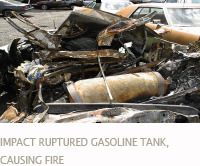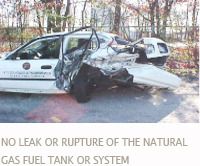CNG Trucks
Topic 9951 | Page 1
I tried to lookup actual instances that happened in the United States in which CNG or LNG tanks exploded couldn't find much.
we were buying and selling the old CNG trucks from the had company for a while. they are great. where i live is the cheapest in the nation for CNG at 1.17 lol.
the company my dad works for is going completely CNG. they have been making this transition for about a year now and so far no problems.
you can have a tank and compressor installed and sell to the public and then just pay your normal bill from what you use. plus the incentives...
swift has jumped on board as well.
my family has 2 personal cng vehicles and its totally worth it where we live.
over seas home made tanks kill people all the time.
{Ex science teacher here.] Remember the tanks have compressed natural gas, not liquefied gas. So the CNG in the tank is a gas, not a liquid.
CNG is waaaay safer than diesel. Most comparisons I found on the internet are CNG and gasoline. Gasoline is like dynamite, diesel is not so much. Here are two photos comparing a ruptured automobile gasoline tank (left) to a ruptured CNG tank (right): (I know they're tiny.) 

Here is the text from one web site:
Natural Gas is lighter than air. This means that it will not puddle (like gasoline) or sink to the ground like propane, which is heavier than air. Instead, Natural Gas will rise and dissipate in the atmosphere.
Natural gas also has a higher ignition temperature. This means that it is much harder to ignite. Also the storage systems used for compressed natural gas are infinitely stronger that the gasoline tanks found on cars and trucks today.
Compare:
property: Diesel || CNG
State: Liquid || Gas
Leak: Pools || floats away
Weight: Heavier than air || lighter than air
Ignite Temp (°F): . 400-500 || 1,350
Flammability Range*: 0.7% - 5.0% || 5.3% - 14%
Toxic exposure: none || none
Container: Aluminum tank || engineered carbon fiber tank
* Flammability range: (Think Blood Alcohol Concentration percents) The concentration of diesel or Natural gas in the air. The natural gas must have more concentration - at least 5.3% compared to diesel's .7% before it will burn. Outside these numbers, too high or too low, no fire will result.
For some videos of destructive testing of CNG tanks, including crash, dynamite and pistol shot, Mythbuster style but as exciting as your high school science movie check this out: "O" ring CNG Fuel Systems
Class dismissed.
Smith! High Five! ![]()
I saw a series of fuel tankers filling up at the CNG pumps at a truck stop recently, all the same company. I can't remember what company it was or even what state that was in, but I remember thinking that stuff must be safe if they're hauling flammable liquids with those trucks.
HOS:
Hours Of Service
HOS refers to the logbook hours of service regulations.I haven't driven a CNG truck yet, but a CNG driver told me, depending on the fuel station, it could take 45mins - 1 hour to fill up. That's not CPM/Driving time!
CPM:
Cents Per Mile
Drivers are often paid by the mile and it's given in cents per mile, or cpm.
Years ago in the early '80s, a real estate agent/friend, had a son who drove a tanker.. propane, I believe. Was involved in a wreck in Memphis and that tanker took off like a rocket from hell, killing him and sent the rogue tank torpedoing thru a couple houses too close to the 240 loop. I believe his name was Randy. I would never consider a pressurized tank, personally.
Randy Benson of West Memphis.

Years ago in the early '80s, a real estate agent/friend, had a son who drove a tanker.. propane, I believe. Was involved in a wreck in Memphis and that tanker took off like a rocket from hell, killing him and sent the rogue tank torpedoing thru a couple houses too close to the 240 loop. I believe his name was Randy. I would never consider a pressurized tank, personally.
that's propane though... completly different gas. read that post up earlier and you can see there's a much bigger difference
In the end all flammable fuels are dangerous, but some more or less than others.
I don't believe living my life in fear of the various dangers that can happen.. I could walk out my front door right now and have my 2nd floor apartment walkway collapse, crushing me under the cement.
Some people drive every day with 12,000 gallons of gasoline behind them. And truly, gasoline is close to dynamite in explosive power.
The propane mentioned above was in a tanker, not the fuel supply for a truck. Propane is heavier than air and so a leak would pool up in a dangerous puddle - even the gas version of LPG.
New Reply:
New! Check out our help videos for a better understanding of our forum features

















Preview:








 TT On Facebook
TT On Facebook
Not only does it have gas cylinders behind the cab but also 2 huge gas cylinders (1 on each side) that replaces the diesel tanks.
I don't care what safety precautions are taken or are put in place. One side swipe can rupture the side tanks(that are under pressure) so instead of one firey explosion you get 3 for the price of one. Sure I don't know enough about the CNG trucks but seems to be extremely risky to me.
True diesel tanks can be ruptured and catch fire also but at least they are not under pressure